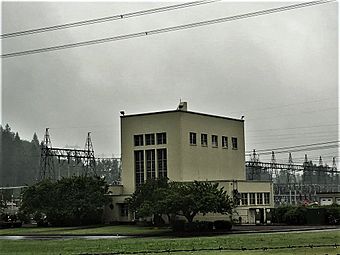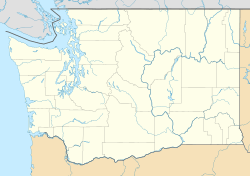Covington Electrical Substation, Bonneville Power Administration facts for kids
Quick facts for kids |
|
|
Covington Electrical Substation, Bonneville Power Administration
|
|

Northeast view of Covington Electrical Substation untanking tower
|
|
| Location | 28401 Covington Way SE, Covington, Washington |
|---|---|
| Area | 36.93 acres (14.95 ha) |
| Built | 1941 |
| Built by | C. F. Davidson Company |
| Architectural style | Modern Movement |
| NRHP reference No. | 100002475 |
| Added to NRHP | May 29, 2018 |
The Covington Electrical Substation, Bonneville Power Administration is a very important electrical substation located in Covington, Washington. It helps bring electricity to many homes and businesses. Because of its historical importance, it was added to the National Register of Historic Places on May 29, 2018. This means it's recognized as a special place worth preserving.
Contents
Powering the Puget Sound
Bringing Electricity to the Region
Imagine a time when many places didn't have reliable electricity! The Bonneville Power Administration (BPA) was created to change that. Their big job was to bring power from the Bonneville Dam. This dam was the first place to generate electricity for the government on the Columbia River.
The BPA wanted to deliver this power to areas like the Puget Sound in Washington. To do this, they needed special stations called substations. The Covington Substation was built between 1940 and 1942. It was one of the first 14 substations in what was called the "master grid." This grid was like a giant network of power lines and stations.
Building the Substation
The land for the Covington Substation was prepared as part of a Works Progress Administration (WPA) project. The WPA was a government program during the Great Depression. It helped put people to work building important things like roads and buildings.
The Covington Substation officially started working on March 3, 1942. It was a crucial link, connecting the electrical systems of Seattle City Light and Tacoma City Light. This made the power supply much more reliable for these cities.
Later, the BPA decided to connect the grid to the Grand Coulee Dam as well. This was important because it created a backup power source. If one dam had a problem, the other could still supply power. This was especially important during times of national emergency. A new power line was built right over the Cascade Range (the Cascade Mountains) to link the Coulee Dam to the Covington Substation.
What Makes it Special?
Many of the main buildings at the Covington Substation were built in a style called Streamline Moderne. This was a popular design style in the 1930s and 1940s. It often featured smooth, curved shapes and a modern look.
Several structures at the substation are considered historically important. These include the untanking tower, the control house, and the switchyard. Other buildings were added over the years, like the heavy machinery shop (1953) and the communication building (1958). There's also an automotive storage building (1959), a maintenance warehouse (1959), and a microwave tower (around 1966).
The Untanking Tower
The most noticeable building at the substation is the untanking tower. This tall structure, about 63 feet (19 m) high, helps service the large transformers in the switchyard. These transformers are filled with oil. Usually, the oil pumps would be in a separate building. But at the Covington Substation, the oil pumps were cleverly placed in the basement of the untanking tower itself. The tower has a flat roof and flat-roofed sections extending out from its sides.


